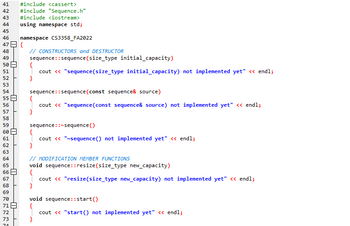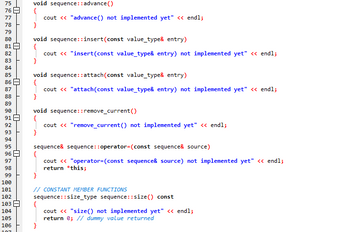
Database System Concepts
7th Edition
ISBN: 9780078022159
Author: Abraham Silberschatz Professor, Henry F. Korth, S. Sudarshan
Publisher: McGraw-Hill Education
expand_more
expand_more
format_list_bulleted
Question

Transcribed Image Text:00
H2BH 45 6F84958123455%望859123456印丽的龙12B7M
□
41
42
43
44
50
47 {
60
66
#include <cassert>
#include "Sequence.h"
#include <iostream>
using namespace std;
70
namespace CS3358_FA2022
// CONSTRUCTORS and DESTRUCTOR
sequence::sequence (size_type initial_capacity)
cout << "sequence(size_type initial_capacity) not implemented yet" << endl;
}
sequence::sequence (const sequence& source)
sequence::~sequence()
cout << "~sequence() not implemented yet" << endl;
}
cout << "sequence(const sequence& source) not implemented yet" << endl;
// MODIFICATION MEMBER FUNCTIONS
void
{
sequence::resize(size_type new_capacity)
cout << "resize(size_type new_capacity) not implemented yet" << endl;
}
}
void sequence::start()
cout << "start() not implemented yet" << endl;

Transcribed Image Text:-M
HONOR 58681
M
75
76
77
78
79
80
82
83
84
87
89
90
91
92
93
94
95
96
97
98
99
100
101
102
103
104
105
106
107
П
-
-0
M
void sequence:: advance()
cout << "advance() not implemented yet" << endl;
}
void sequence::insert(const value_type& entry)
cout << "insert(const value_type& entry) not implemented yet" << endl;
void sequence::attach(const value_type& entry)
cout << "attach(const value_type& entry) not implemented yet" << endl;
}
void sequence::remove_current()
cout << "remove_current() not implemented yet" << endl;
}
sequence& sequence::operator=(const sequence& source)
cout << "operator=(const sequence& source) not implemented yet" << endl;
return "this;
}
// CONSTANT MEMBER FUNCTIONS
sequence::size_type sequence::size() const
cout << "size() not implemented yet" << endl;
return 0; // dummy value returned
Expert Solution
arrow_forward
Step 1
Coded using C++.
Step by stepSolved in 3 steps with 4 images

Knowledge Booster
Learn more about
Need a deep-dive on the concept behind this application? Look no further. Learn more about this topic, computer-science and related others by exploring similar questions and additional content below.Similar questions
- Activity 1 This program firstly initializes an object of struct Cirele with values and then updates those using pointers. The program uses structure notation once and pointer notation another afterwards. #include #include #define MIN 1 #define MAX 30 struct Circle { float xCoord; float yCoord; float radius; }; /* prototypes */ float getRandomNumber (int min, int max); void printByValue(struct Circle cirobj); void setValue(float *target, float newValue); void printByReference(struct Circle *cirObj); int main(void) { /* Declare a struct circle and name it circleobject */ struct Circle circleObject; /* Fill circleObject's members with random numbers */ circleobject.xCoord = getRandomNumber(MIN, MAX); circleobject.yCoord = getRandomNumber (MIN, MAX); circleobject.radius = getRandomNumber (MIN, MAX); /* Printing values of the circle by calling function print by value */ printByValue(circleobject); /* update values of circle one by one */ setValue (&circleobject.xCoord, getRandomNumber(MIN,…arrow_forward#include <iostream> #include <iomanip> #include <string> #include <vector> using namespace std; class Movie { private: string title = ""; int year = 0; public: void set_title(string title_param); string get_title() const; // "const" safeguards class variable changes within function string get_title_upper() const; void set_year(int year_param); int get_year() const; }; // NOTICE: Class declaration ends with semicolon! void Movie::set_title(string title_param) { title = title_param; } string Movie::get_title() const { return title; } string Movie::get_title_upper() const { string title_upper; for (char c : title) { title_upper.push_back(toupper(c)); } return title_upper; } void Movie::set_year(int year_param) { year = year_param; } int Movie::get_year() const { return year; } int main() { cout << "The Movie List program\n\n"…arrow_forward: An animal shelter, which holds only dogs and cats, operates on a strictly"first in, firstout" basis. People must adopt either the "oldest" (based on arrival time) of all animals at the shelter,or they can select whether they would prefer a dog or a cat (and will receive the oldest animal ofthat type). They cannot select which specific animal they would like. Create the data structures tomaintain this system and implement operations such as enqueue, dequeueAny, dequeueDog,and dequeueCat. You may use the built in Linkedlist data structure.arrow_forward
- struct Info { int id; float cost; }; Given the struct above, the following code segment will correctly declare and initialize an instance of that struct. Info myInfo = {10,4.99}; Group of answer choices True False ============== Consider the following code fragment. int a[] = {3, -5, 7, 12, 9}; int *ptr = a; *ptr = (*ptr) + 1; cout << *ptr; Group of answer choices 4 -5 3 Address of -5 =============== What will happen if I use new without delete? Group of answer choices The program will never compile The program will never run The program will run fine without memory leak None of thesearrow_forwardGiven the following declaration : char msg[100] = "Department of Computer Science"; What is printed by: strcpy_s(msg, "University"); int len = strlen(msg); for (int i = len-3; i >0; i--) { msg[i] = 'x'; } cout << msg;arrow_forward#ifndef NODES_LLOLL_H#define NODES_LLOLL_H #include <iostream> // for ostream namespace CS3358_SP2023_A5P2{ // child node struct CNode { int data; CNode* link; }; // parent node struct PNode { CNode* data; PNode* link; }; // toolkit functions for LLoLL based on above node definitions void Destroy_cList(CNode*& cListHead); void Destroy_pList(PNode*& pListHead); void ShowAll_DF(PNode* pListHead, std::ostream& outs); void ShowAll_BF(PNode* pListHead, std::ostream& outs);} #endif #include "nodes_LLoLL.h"#include "cnPtrQueue.h"#include <iostream>using namespace std; namespace CS3358_SP2023_A5P2{ // do breadth-first (level) traversal and print data void ShowAll_BF(PNode* pListHead, ostream& outs) { cnPtrQueue queue; CNode* currentNode; queue.push(lloLLPtr->getHead()); while (!queue.empty()) { currentNode = queue.front(); queue.pop(); if…arrow_forward
- typedef char string[50]; struct a Tag { int a; }; // 1. indicate the data type returned by function Exam() Exam(struct a Tag *ptr) { float b; double C[ 10 ]; string s; } // Access the members of the structure variable indirectly via ptr // You are REQUIRED to use the structure pointer operator; see comments numbered 2 to 5. // 2. input the value of member a scanf("%d", ); // 3. assign 3.1416 as the value of member b = 3.1416; // 4. print the value of the last element of array C. printf("%lf\n", |); // 5. copy "Hello" into string s strcpy( return ptr; , "Hello");arrow_forwardQuestion 9 #include using namespace std; struct ListNode { string data; ListNode *next; }; int main() { ListNode *ptr, *list; list = new ListNode; list->data = "New York"; ptr = new ListNode; ptr->data = "Boston"; list->next = ptr; ptr->next = new ListNode; ptr->next->data = "Houston"; ptr->next->next = nullptr; // new code goes here Which of the following code correctly deletes the last node of the list when added at point of insertion indicated above? O delete ptr->next; ptr->next = nullptr;; O ptr = list; while (ptr != nullptr) ptr = ptr->next; delete ptr; O ptr = last; delete ptr; list->next->next = nullptr; delete ptr; O None of thesearrow_forward
arrow_back_ios
arrow_forward_ios
Recommended textbooks for you
 Database System ConceptsComputer ScienceISBN:9780078022159Author:Abraham Silberschatz Professor, Henry F. Korth, S. SudarshanPublisher:McGraw-Hill Education
Database System ConceptsComputer ScienceISBN:9780078022159Author:Abraham Silberschatz Professor, Henry F. Korth, S. SudarshanPublisher:McGraw-Hill Education Starting Out with Python (4th Edition)Computer ScienceISBN:9780134444321Author:Tony GaddisPublisher:PEARSON
Starting Out with Python (4th Edition)Computer ScienceISBN:9780134444321Author:Tony GaddisPublisher:PEARSON Digital Fundamentals (11th Edition)Computer ScienceISBN:9780132737968Author:Thomas L. FloydPublisher:PEARSON
Digital Fundamentals (11th Edition)Computer ScienceISBN:9780132737968Author:Thomas L. FloydPublisher:PEARSON C How to Program (8th Edition)Computer ScienceISBN:9780133976892Author:Paul J. Deitel, Harvey DeitelPublisher:PEARSON
C How to Program (8th Edition)Computer ScienceISBN:9780133976892Author:Paul J. Deitel, Harvey DeitelPublisher:PEARSON Database Systems: Design, Implementation, & Manag...Computer ScienceISBN:9781337627900Author:Carlos Coronel, Steven MorrisPublisher:Cengage Learning
Database Systems: Design, Implementation, & Manag...Computer ScienceISBN:9781337627900Author:Carlos Coronel, Steven MorrisPublisher:Cengage Learning Programmable Logic ControllersComputer ScienceISBN:9780073373843Author:Frank D. PetruzellaPublisher:McGraw-Hill Education
Programmable Logic ControllersComputer ScienceISBN:9780073373843Author:Frank D. PetruzellaPublisher:McGraw-Hill Education

Database System Concepts
Computer Science
ISBN:9780078022159
Author:Abraham Silberschatz Professor, Henry F. Korth, S. Sudarshan
Publisher:McGraw-Hill Education

Starting Out with Python (4th Edition)
Computer Science
ISBN:9780134444321
Author:Tony Gaddis
Publisher:PEARSON

Digital Fundamentals (11th Edition)
Computer Science
ISBN:9780132737968
Author:Thomas L. Floyd
Publisher:PEARSON

C How to Program (8th Edition)
Computer Science
ISBN:9780133976892
Author:Paul J. Deitel, Harvey Deitel
Publisher:PEARSON

Database Systems: Design, Implementation, & Manag...
Computer Science
ISBN:9781337627900
Author:Carlos Coronel, Steven Morris
Publisher:Cengage Learning

Programmable Logic Controllers
Computer Science
ISBN:9780073373843
Author:Frank D. Petruzella
Publisher:McGraw-Hill Education